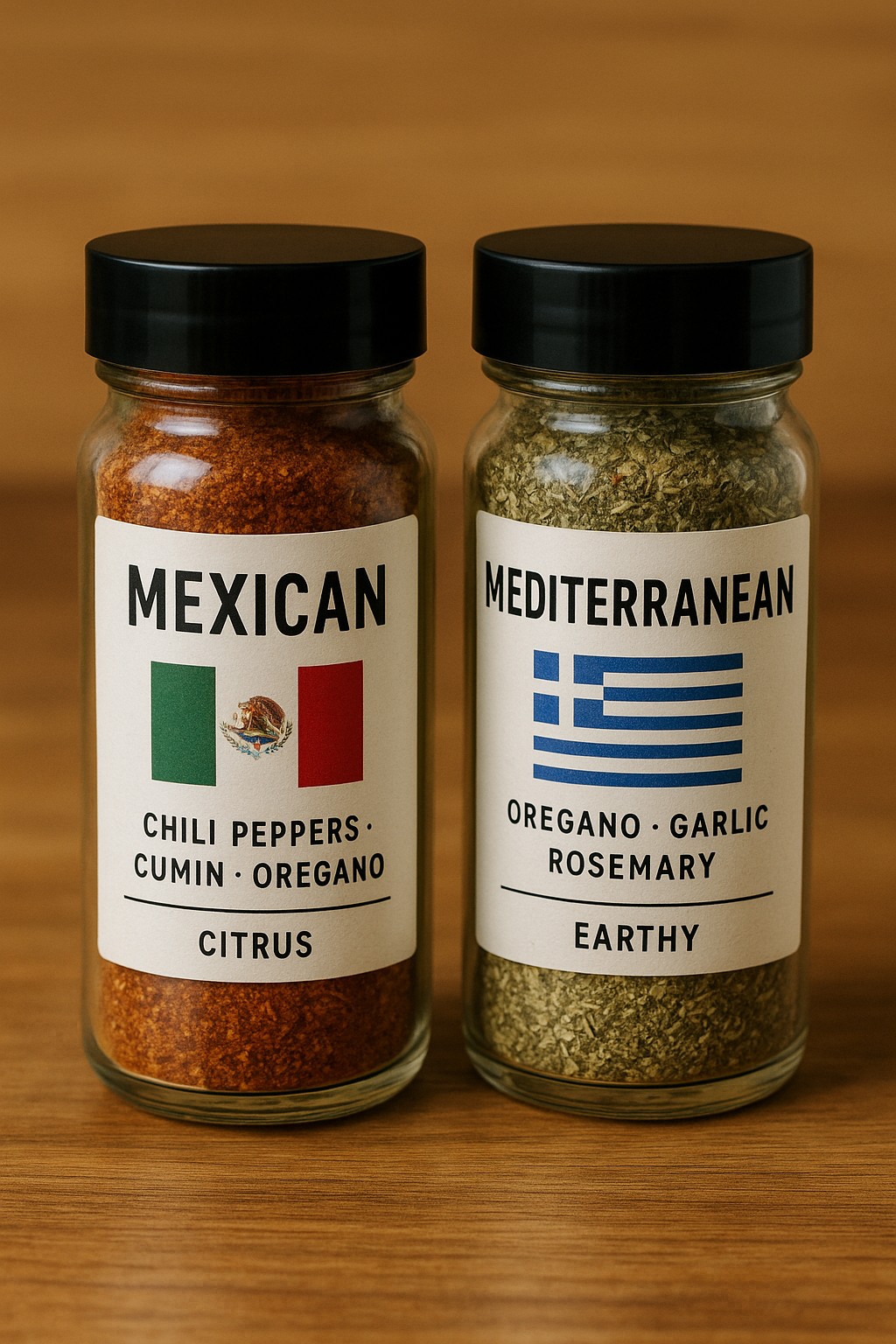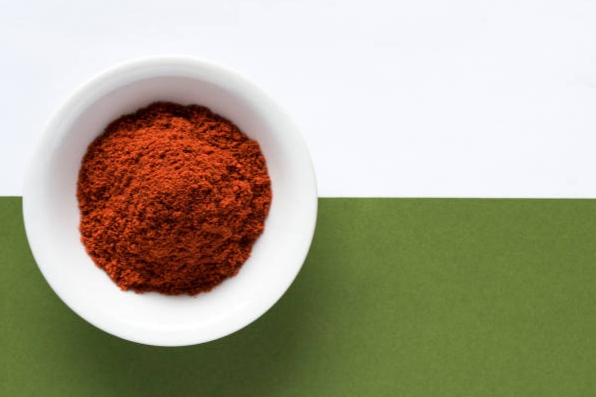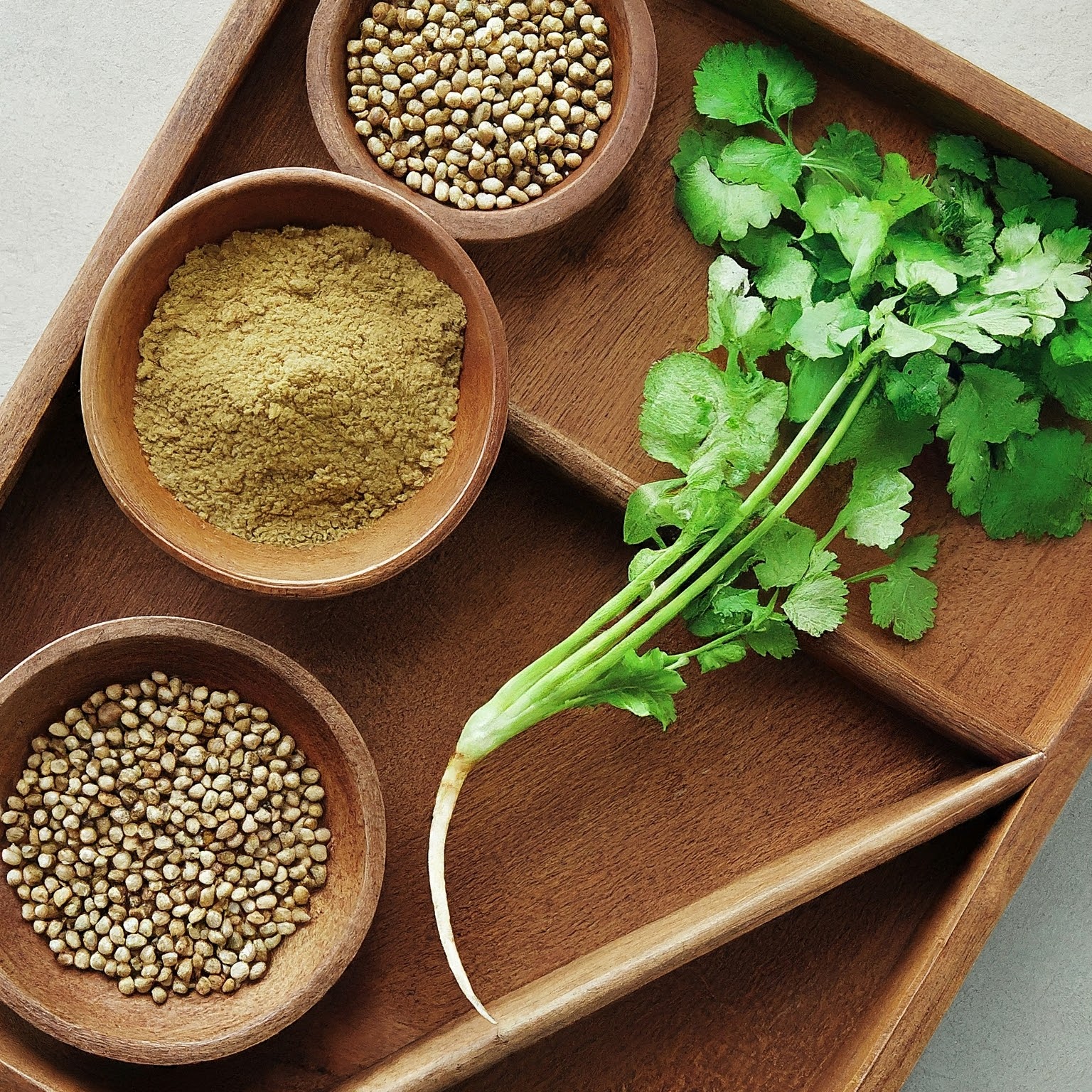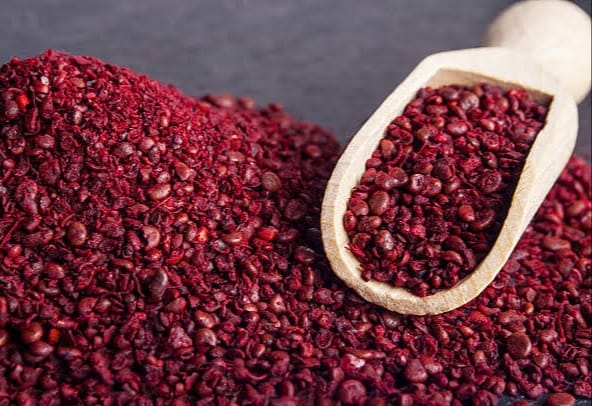What is Moringa Tea?
Moringa tea is made from the leaves of the Moringa oleifera tree, often called the “drumstick tree” or “miracle tree” because of its many health benefits. This herbal tea is packed with nutrients, antioxidants, and anti-inflammatory properties, making it a popular choice for health enthusiasts.
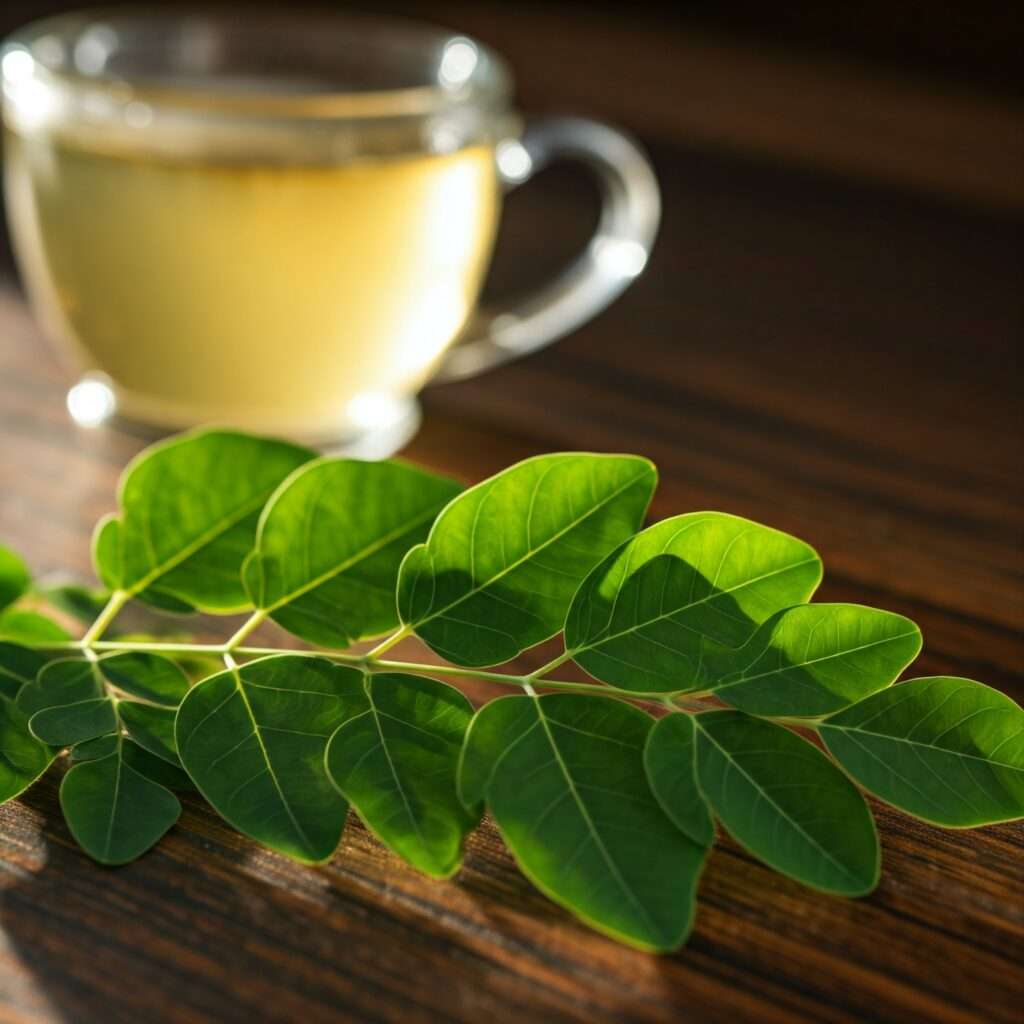
Moringa Tea Nutrition Facts
Here’s a table with the nutrition facts for moringa tea based on an 8 oz (240 ml) serving made from 2 grams of dried moringa leaves:
| Nutrient | Amount per Serving (240 ml) | % Daily Value (DV)* |
| Calories | 5 kcal | 0% |
| Total Fat | 0 g | 0% |
| Cholesterol | 0 mg | 0% |
| Sodium | 1 mg | 0% |
| Total Carbohydrates | 1 g | 0% |
| Dietary Fiber | 0.5 g | 0% |
| Total Sugars | 0 g | 0% |
| Protein | 0.5 g | 1% |
| Vitamin A | 180 IU | 4% |
| Vitamin C | 3 mg | 4% |
| Vitamin E | 0.5 mg | 3% |
| Calcium | 40 mg | 4% |
| Iron | 0.4 mg | 2% |
| Potassium | 40 mg | 1% |
| Magnesium | 5 mg | 1% |
Summary
Moringa tea is a low-calorie beverage, with only about 5 kcal per serving. It’s rich in vitamins and minerals, including vitamin A, vitamin C, vitamin E, calcium, iron, potassium, and magnesium. It provides a small amount of protein and dietary fiber, but contains no fat, cholesterol, or sugars, making it a healthy addition to your diet. Its high antioxidant content supports overall wellness and immune function.
Moringa Tea Benefits
This herbal tea is very nutritious apart from its delicious taste. Some Important health benefits are here
- Maintaining Immune System: Rich in vitamins A, C, and E, as well as various antioxidants, making it a powerful immune system booster. The high levels of antioxidants help fight off free radicals and reduce oxidative stress, supporting overall immune health. Consuming this tea regularly can enhance your body’s natural defense mechanisms.
- Managing Blood Sugar: It may aid in managing blood sugar levels, making it beneficial for individuals with diabetes or those at risk. Compounds found in moringa, such as isothiocyanates, help regulate glucose levels and improve insulin sensitivity. Drinking moringa tea can be a complementary approach to traditional diabetes management but always consult with a healthcare professional before making any changes to your regimen.
- Rich in antioxidants: It contains high levels of antioxidants that help fight oxidative stress and may reduce the risk of chronic diseases.
- Anti-inflammatory properties: The anti-inflammatory compounds in this herbal tea may help reduce inflammation and improve overall health.
- Supports digestive health: This tea aids digestion and may help with problems like constipation and bloating.
- Regulates blood sugar levels: Some studies suggest that moringa tea may help control blood sugar levels, making it beneficial for people with diabetes.
“In every cup of herbal tea, there is a symphony of nature’s finest gifts, bringing harmony and health to our daily lives”
How to make moringa tea
Making this tea is simple and can be made using fresh or dried moringa leaves. Here’s a basic recipe:
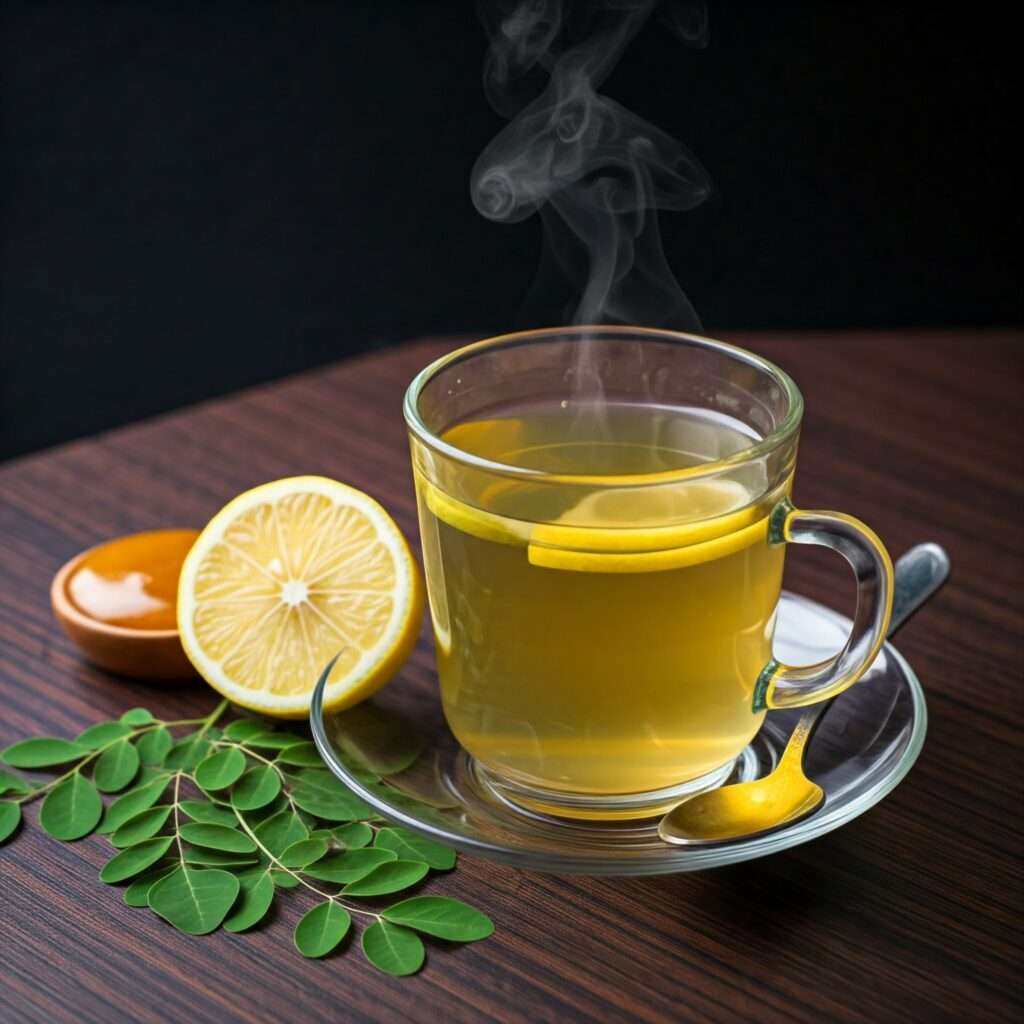
Ingredients:
- 1 cup water
- 1 tablespoon dried moringa leaves
- Honey or lemon (optional)
Instructions:
- Boil water in a pot.
- Add the moringa leaves and let them soak for 5-10 minutes.
- Gently filter out the leaves, then transfer the warm, aromatic tea into your favorite mug.
- Add honey or lemon to taste if desired.
- Enjoy your refreshing and nutritious tea!
Moringa tea recipes
There are many ways to enjoy this tea. Here are some delicious variations:
Iced Moringa Tea
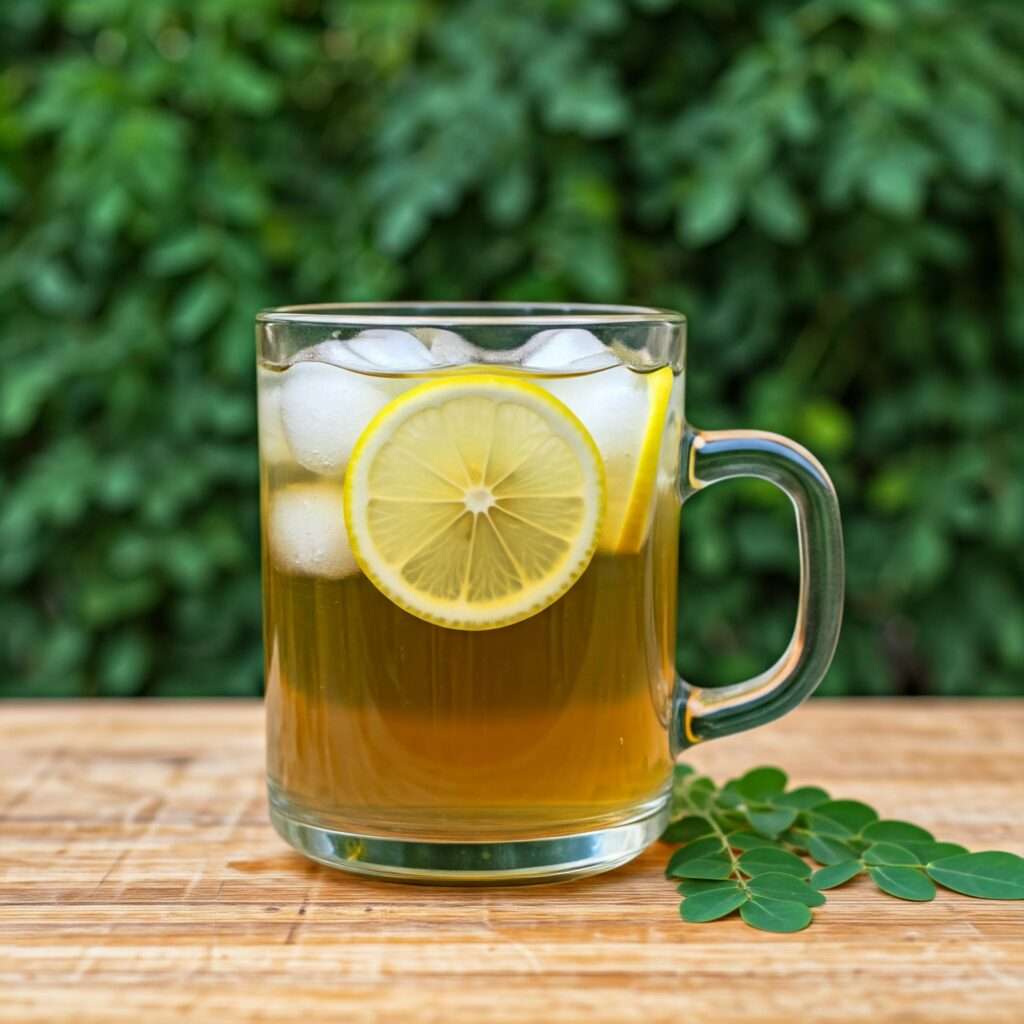
Ingredients:
- Brewed moringa tea
- ice cubes
- Lemon slices (for garnish)
Instructions:
- Prepare tea as you normally would and let it chill in the refrigerator.
- Pour the chilled moringa tea over a glass filled with ice cubes for a refreshing treat.
- Garnish with a refreshing lemon slice and enjoy!
Moringa Tea Latte

Ingredients:
- Brewed moringa tea
- Steamed milk (dairy or plant-based)
- Honey (optional, to taste)
Instructions:
- Brew moringa tea and pour it into a cup.
- Add steamed milk to the brewed tea.
- Stir in honey for a creamy and sweet taste, if desired.
Spiced Moringa Tea
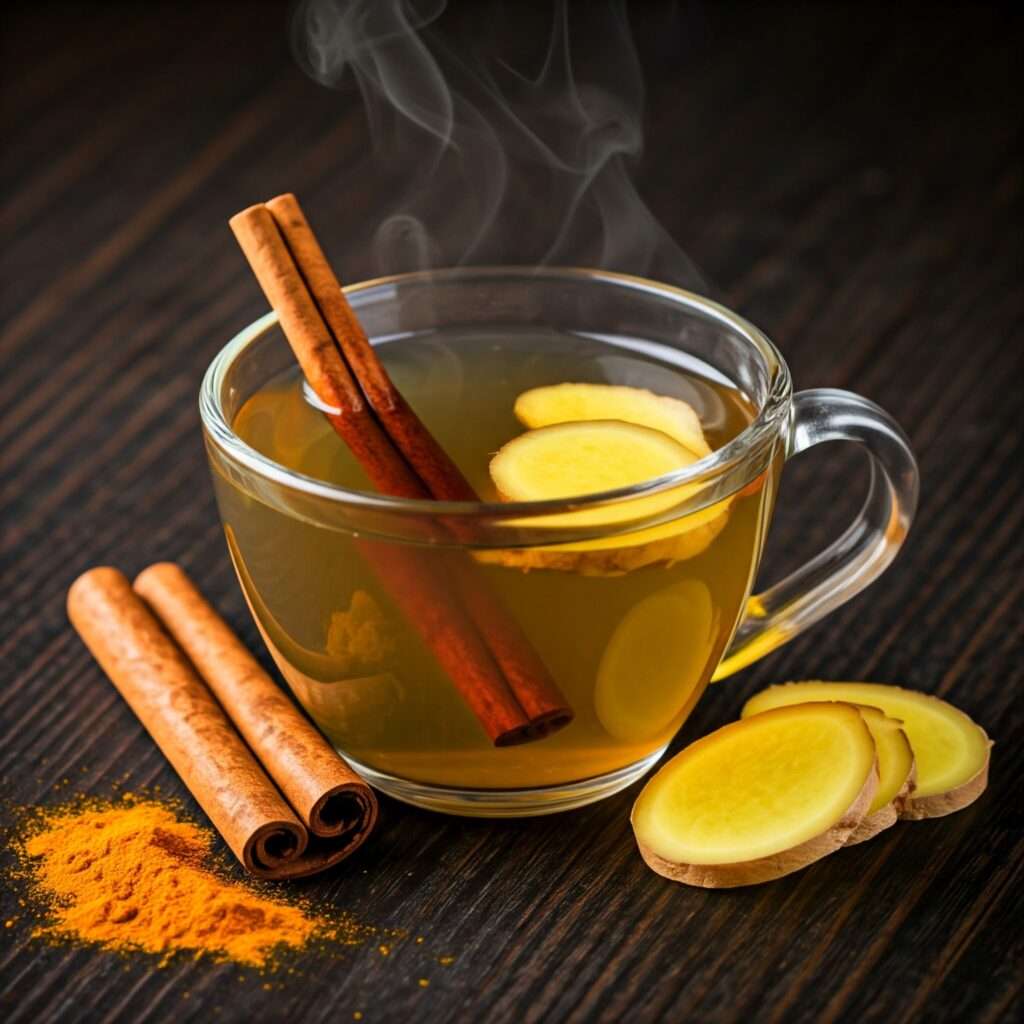
Ingredients:
- Brewed moringa tea
- 1 cinnamon stick
- A few slices of ginger
- A pinch of turmeric
Instructions:
- Brew moringa tea and add a cinnamon stick, ginger slices, and a pinch of turmeric while steeping.
- Let it steep for an additional 5-10 minutes to allow the flavors to infuse.
- Strain the tea and enjoy the added flavor and health benefits.
Refreshing Moringa Tea Recipe
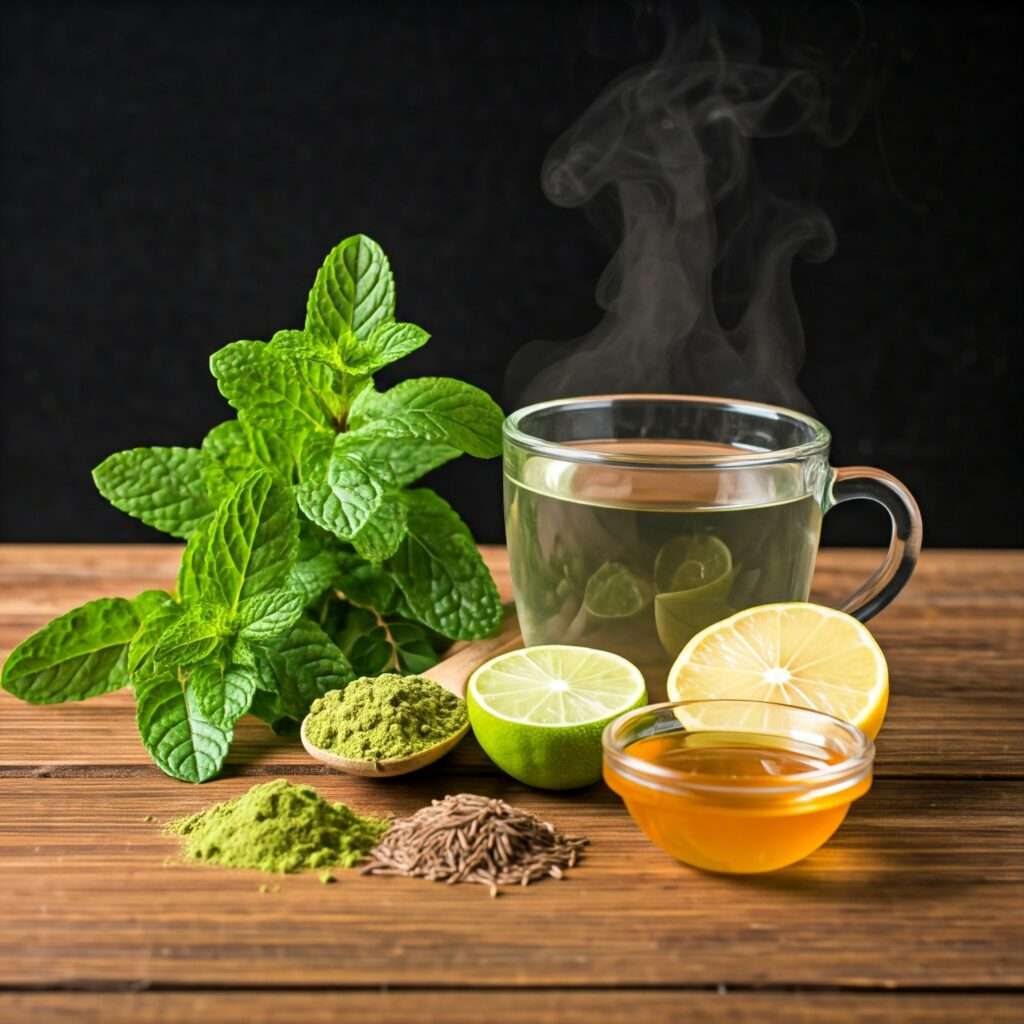
Ingredients:
- 2 teaspoons of moringa powder
- 1 cup of hot water
- 6 mint leaves (thorn)
- 1 teaspoon of cumin seeds
- 1 tablespoon of lemon juice (lime)
- Organic honey (optional, as sweetener)
Instructions:
- Boil 800 milliliters of water.
- Toss the torn mint leaves and cumin seeds into the boiling water.
- Lower the heat and let it simmer gently for about 5 minutes.
- Add the moringa powder and lemon juice. Let it steep for another 5 minutes.
- Strain the tea into cups.
- Add honey if desired and enjoy!
Summary
Moringa tea is a great addition to your routine, offering a plethora of health benefits and a versatile flavor profile. Whether you drink it hot, cold, or with a twist, this herbal tea is sure to delight your taste buds and boost your health. For more herbal tea options, explore the benefits of oregano tea and barley tea, each offering unique health properties and delicious flavors.
Possible Side Effects and Cautions
- Potential Side Effects: While generally safe, some people might experience minor side effects like upset stomach or diarrhea.
- Why it Matters: It’s important to be aware of these potential side effects so you know what to watch out for.
Precautions:
- Pregnancy and Breastfeeding: If you’re pregnant or breastfeeding, it’s best to consult with a healthcare professional before consuming this herbal tea, as there’s limited research on its effects during these periods.
- Medications: This Herbal tea might interact with certain medications, such as blood thinners. It’s crucial to talk to your doctor if you’re on any medications.
- Underlying Health Conditions: If you have any underlying health conditions, it’s always a good idea to consult with a healthcare professional before incorporating moringa tea into your diet.
Choosing and Storing Your Tea
Selecting Quality Tea:
- Look for organic, sustainably sourced moringa tea whenever possible.
- Check for signs of freshness and avoid tea that has a stale or off-putting odor.
- Consider purchasing from reputable sources like health food stores or online retailers specializing in herbal teas.
Proper Storage:
- Store your tea in an airtight container in a cool, dark, and dry place, away from direct sunlight and moisture.
- This helps to preserve its flavor, aroma, and potency.
Moringa Tea Around the World
Cultural Traditions:
- In many parts of Africa, Asia, and South America, moringa leaves have been traditionally used for centuries as a food source and for their medicinal properties.
- Explore how different cultures prepare and consume this tea, from simple infusions to elaborate blends with other herbs and spices.
- You can find recipes and cultural insights from various regions to enrich your understanding of this versatile plant.
Comparing to Other Teas
The Moringa Difference:
- While other herbal teas like green tea, ginger tea, and chamomile tea offer their own unique health benefits, moringa tea stands out for its exceptionally high concentration of vitamins, minerals, and antioxidants.
- Unlike Barley tea, known for its digestive benefits and potential to aid in weight management, or Organo tea, often touted for its antioxidant and anti-inflammatory properties, Basil tea on the other hand, is renowned for its anti-inflammatory properties and ability to support respiratory health and reduce stress. Yet, moringa tea still outshines with its impressive array of nutrients and broad spectrum of benefits.
Beauty Recipes
More Than Just a Drink:
- Explore the potential of moringa for skin and hair care.
- You can find recipes for DIY face masks using moringa powder and other natural ingredients like honey, yogurt, and turmeric.
- Experiment with moringa leaf infusions as a hair rinse to add shine and nourish your scalp.
- Remember to always do a patch test before applying any homemade remedies to your skin.
Weight Management
A Helper, not a Magic Wand:
- It can be a supportive component of a healthy weight management plan.
- Its low calorie content and fiber content can contribute to feelings of fullness, which may help reduce overall calorie intake.
- However, it’s essential to remember that sustainable weight management requires a balanced diet, regular exercise, and a healthy lifestyle.
Energy and Focus
A Natural Boost:
- Some individuals attribute the potential for enhanced energy and focus to moringa tea’s adaptogenic properties, which may help the body better respond to stress and maintain overall well-being.
- This tea is also rich in B vitamins, essential nutrients that play a crucial role in energy production within our cells.
- However, individual experiences may vary, and the effects can differ depending on factors such as individual metabolism and overall health.
Good for the Planet
Eco-Friendly:
- Moringa is a drought-resistant and fast-growing tree that can thrive in arid conditions.
- Cultivating moringa can help prevent soil erosion and improve soil fertility.
- By supporting sustainable moringa cultivation, you can contribute to environmental conservation and support local communities.
Conclusion
Moringa tea offers a unique blend of flavor and potential health benefits. From its antioxidant and immune-boosting properties to its potential support for heart health and blood sugar control, this versatile herbal beverage has garnered significant attention. While further research is needed to fully understand its long-term effects, incorporating moringa tea into your daily routine can be a simple and enjoyable way to explore its potential benefits. Remember to consult with a healthcare professional before making any significant dietary changes, especially if you have any underlying health conditions or are taking medications.
FAQs’
What is Moringa Tea Good For?
It has antioxidants, vitamins, and minerals in sufficient quantities. It supports immune function, improves digestion, reduces inflammation, and promotes overall health. It’s also known for its energy-boosting properties without the jitters of caffeine.
Does Moringa Tea Have Caffeine?
No, moringa tea is naturally caffeine-free, making it a great alternative for those looking to reduce their caffeine intake.
What Does Moringa Tea Taste Like?
It has a mild, earthy flavor with a hint of spinach and a subtle, grassy undertone. It’s often described as refreshing and slightly nutty.
How to Make Moringa Tea from Fresh Leaves?
To make this tea from fresh leaves, wash the leaves thoroughly and boil them in water for about 10-15 minutes. Strain the liquid, and your fresh moringa tea is ready to be enjoyed.
When to drink moringa tea?
The best time to drink this tea is in the morning or early afternoon for an energy boost and to reap its nutritional benefits throughout the day. It can also be enjoyed post-meal to aid digestion.
Can I Drink Moringa Tea at Night?
Yes, since this tea is caffeine-free, it can be consumed at night without disrupting sleep. It also relaxes your body and uplift your mood before bedtime.
Is Moringa Tea Safe During Pregnancy?
This tea is generally safe, but it’s always best to consult with a healthcare professional before adding any new supplement to your diet during pregnancy to ensure it aligns with your health needs.
Does Moringa Tea Help with Weight Loss?
This tea may aid in weight loss by boosting metabolism and promoting fat breakdown. Its rich nutrient content can also help curb cravings and support a balanced diet.
Where to Buy Moringa Tea?
Moringa tea can be purchased online from retailers like Amazon, health food stores, and specialty tea shops. Look for organic and high-quality products for the best benefits.
References:
General Information and Health benefits
- Healthline: 6 Science-Based Health Benefits of Moringa oleifera
- MedicalNewsToday: 16 Potential Benefits of Moringa
- WebMD: Are There Health Benefits to Drinking Moringa Tea?
- Forbes: Moringa: Benefits, Side Effects and Risks
